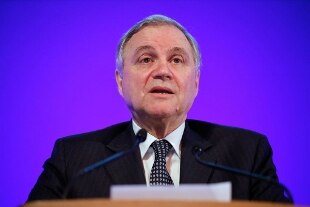Bank of Italy, Visco: "No risks in using Mes but it's not a boon"
Visco: uncertainty forecasts, a well-constructed plan is needed.
GDP 2020 around -20%
Recovery Fund, Visco: "Making up for delays in education and research"
Share
31 October 2020The governor of the Bank of Italy Ignazio Visco spoke at the feast of the Foglio where he talked about work, businesses and the South but also about the Mes, the European measures to support Europe, identifying in the 'Keynesian method' a solution to the current economic problems even in the short term.
Italian companies
"they are little capitalized, they live on turnover, on what comes in, but also and a lot on debt. We need to shift attention to capitalization" and this can also be done with a public incentive. Visco called for "investing in innovation", something that Italian companies have not done enough so far. "Twenty years ago, the production system did not react well to the end of the cold war and to globalization. It reacted by reducing the cost of labor and not investing in the new, instead we must invest in the new. We have many delays to overcome" and we must do so by aiming for also on public-private partnerships, he explained.
In reference to the
Mes,
he stressed the importance of identifying "the sectors and projects to be financed with these funds is even more important than going to see what kind of funds to draw on". "Beyond going to see the nature of these loans, we need to see what to do with it". "We talk too much about which financial instruments need to be activated in our discussion on European funds, the questions are aimed at financing not where we should go, which interventions should have priority in this phase which has returned to being an emergency. It is very important to intervene. in the emergency but we must not lose sight of the longer period "to overcome" the many years of delay from which we arrive.
"The risk - Visco said - is that we talk too much about which funds must be activated for funding, at a political and media level". On the other hand, priorities must be set because "we come from many years of delays in many fields: research, knowledge, education, infrastructure, information and Tlc. It is more important to look at these projects than on what type of funds we need to draw on. it was more political debate and not only among technicians, who have no responsibility for the decisions to be taken more debate for example on actions to increase
broadband,
ultra-fast "which must be" available immediately otherwise we will not even know how to use remote work and distance learning in the complementary component "it will have.
"There is a fact, that participation in work is low, in the
South
, for
women
, for
young people
: we have 2 million young people who do not study or work and are not in training of any kind, one extraordinary waste, 20%, one third in the south. We need to bring young people into the world of work, prepare them, and give women the opportunity to enter the world of work by having the adequate infrastructure to do so, and do it in the south. With a slogan , think of the young women of the South ".
For Visco it is not yet possible to see what will be "the new normal, what will be the new balances" but we have to get there "prepared". For this reason it is also necessary to "understand how to set the mechanism in motion and make people more competent and increase
the knowledge of children.
And likewise the energy question, on how to activate forms of
clean energy
. The health question, the Mes is linked Given these questions, we can decide which financing to draw on: the market, next generation Eu, Mes. There is a fundamental point: if they are well spent it is then easier to access the market. The central element is to spend them well " .
"The basic point is uncertainty, which affects behavior, for example in reducing expenses, traveling less, the propensity to save increases and this can generate less growth not only in consumption and also in demand, total income ". "We will have a not short period of uncertainty", he added, and "this risk must be faced on the level of economic policy which in the immediate future can only be Keynesian", in order to "make up for where private demand is insufficient".
"It is important to maintain optimism and hope. We saw a very serious crisis linked to the outbreak of the pandemic, in the summer things certainly resumed, the data confirmed a very consistent recovery common to other advanced countries" which show that "despite all the economic system is able to react ". "There are many risks for businesses, especially in some sectors related to travel, tourism, catering, services affected in an extraordinary way, but we have also seen that it was possible to activate public resources" and that "we were able at the level of monetary policy to deploy all the tools "that" will continue. "We know that the intervention of economic policy works, this is a starting point".

